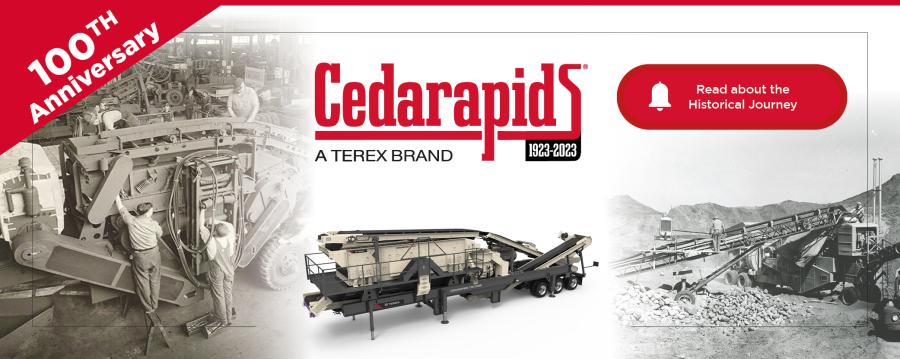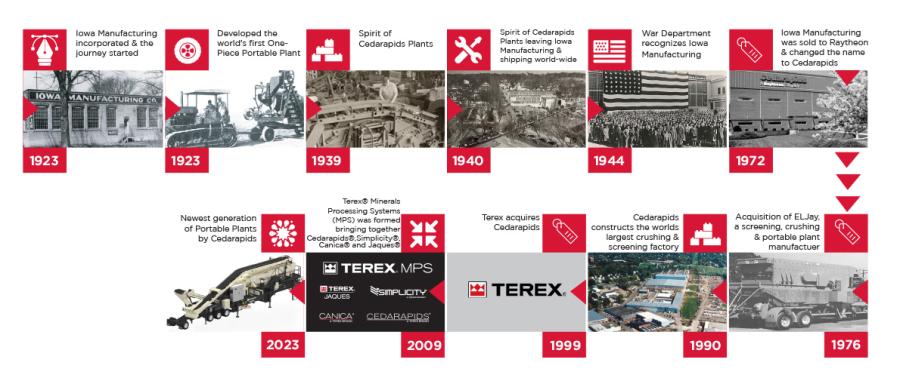Established in 1923, the Cedarapids of today has been built upon an impressive century-old history that, from the solid foundation laid by founder Howard Hall, has seen it grow through The Great Depression of 1929 and World War II, continuing to evolve through multiple acquisitions, pioneering innovations and steadfast dedication to its customers, employees and community.
The brand now sits within the Terex MPS business of Terex Materials Processing, a global manufacturer of materials processing and lifting machinery with a leading portfolio of specialty equipment brands serving the aggregates, environmental, concrete, materials handling and lifting markets.
The roots of Cedarapids were planted in the 1920s, a period that saw a concerted effort from the government to improve infrastructure across the United States — through the "Good Roads Movement" of 1922 — to cope with the rising popularity of automobiles. Back then, Iowa had only 334 miles of paved roads.
"Get Iowa out of the mud" was a slogan heard throughout the state and echoed across the country. Recognizing the demand for the construction of paved roads, Howard Hall and his business partner, John Jay, saw an opportunity and established Iowa Manufacturing Co. in 1923 to develop road construction equipment.
Early road construction equipment was clumsy, hard to transport and costly. Multiple machines ground aggregate, a basic road construction material consisting of crushed gravel, stone and sand. Hall and Jay discovered a young engineer Guy Frazee to develop the "One Piece Outfit", a portable aggregate plant that combined crushing, conveying and screening.
Consolidating all stone processing into one machine increased efficiency and alleviated much of the work required to process aggregate at road construction sites. It also enabled stone to be crushed right at the construction site and dramatically reduce the cost of transporting equipment to different sites.
This signature piece of equipment streamlined road construction and played a vital role in this industry throughout the first half of the twentieth century.
While innovation, durability and quality spurred Iowa Manufacturing's initial growth, the company's commitment to customers distinguished it from competition. During the Great Depression of 1929, Iowa Manufacturing worked with customers to prevent repossession of equipment by extending loans and accepting debt-reduction payments as low as $50. The Works Progress Administration sustained the company by financing road building, a precursor for later infrastructure development.
The next significant chapter in Iowa Manufacturing's history was the role it played in World War II. It contributed to the war effort by manufacturing and shipping equipment all over the world to build roads and landing strips for the military. Many employees fought in the war, and after the first employee fell in combat, co-workers volunteered their day off and labor to construct the Spirit of Cedarapids, a crusher donated to the military in honor of their late friend.
In 1944, the War Department presented Iowa Manufacturing with the Army/Navy E (Excellence) Award in recognition of the patriotism exhibited by Iowa Manufacturing and its employees. A ceremony was held where the company received a flag and each employee a lapel pin.
The war also left a legacy of equipment that remained abroad, which helped develop Iowa Manufacturing's international reputation.
The war also highlighted the importance of roads to the government, with President Dwight D. Eisenhower signing the Federal-Aid Highway Act of 1956, leading to increased road building across the country.
Iowa Manufacturing responded by acquiring New Holland Equipment, a manufacturer of impact crushers since 1912, expanding the company's already extensive crusher product line, while also developing a new line of asphalt pavers.
For years, President Dwight D. Eisenhower's picture hung in the Howard Hall's residence known as the "Brucemore Mansion" in recognition of Eisenhower's impact on the Cedar Rapids community and nation. Over the years that followed, Iowa Manufacturing's reputation for product excellence and employee commitment provided a strong foundation for its future.
Admiration for Hall and a belief that any company connected to him was a strong investment led to Raytheon, a major industrial manufacturer to purchase Iowa Manufacturing in 1972, the year following Hall's death.
The company continued to grow, acquiring EL Jay, a manufacturer of screens, crushers and portable plants, and changed its name to Cedarapids Inc., in 1985.
The 1980s finished with the acquisition of Standard Havens in 1989, a manufacturer of hot mix asphalt plants. This acquisition included the Oklahoma City facility, where all Terex MPS portable plants and products are currently built today.
The growth of Cedarapids Inc. continued with the investment in a "new" operations plant in 1990, which became the world's largest crushing and screening facility under one roof. This was soon followed by the launch of the world's largest tracked jaw plant — the MTP5460, in 1992.
The nineties ended with Cedarapids Inc. becoming part of Terex, a global manufacturer of heavy equipment. Recognizing the quality and history associated with the brand, Terex continued with the company's name, which became Cedarapids — a Terex Company. A decade later, Terex Minerals Processing Systems (MPS) was formed, bringing together Cedarapids, Simplicity, Canica and Jaques, all world leaders in manufacturing high quality, reliable materials processing equipment.
Terex MPS now belongs to the Terex Materials Processing segment of Terex, a leading portfolio of specialty equipment brands serving the aggregates, environmental, concrete, materials handling and lifting markets. The common denominator across Terex MP brands is continued investment in new technologies and innovative solutions that help customers operate their equipment safely, while achieving profitability, sustainability and superior returns.
The influence and legacy Hall left on the manufacturing industry did not go unnoticed. In 2014, 90 years after Iowa Manufacturing was established and more than 40 years from his death, Howard Hall was inducted into the "Hall of Fame", an aggregate industry recognition. As well as the role his innovations played in the nation's road construction and war efforts, the award recognized him for being a community leader and philanthropist, leading an effort to start a radiation center and establish a foundation to distribute capital grants. They also credited him for his "ambition, common sense and a welcoming personality, running the company knowing everyone's name".
Today Cedarapids continues the legacy started by Hall with products that are purposefully designed using customer, end-user and distributor feedback, serving global markets. In more recent times, Cedarapids equipment was used in The Panama Canal expansion project from 2007-2016. Also called the "Third Set of Locks Project", the expansion doubled the capacity of the Panama Canal by adding a new lane of traffic, allowing for a larger number of ships, and increasing the width and depth of the lanes and locks allowing larger ships to pass.
Cedarapids can be proud that its equipment contributed to the increased commercial operations in the Panama Canal from 2016. This is just one example of many prestigious infrastructure projects using Cedarapids equipment, all over the world. Cedarapids continues to innovate and design materials processing equipment that exceeds industry expectations.
Customers inspire the Cedarapids team to "think outside of the box" and develop equipment that goes beyond the norm. An example is the newest portable plant, the CRC1350S that officially launches later in 2023. This portable cone crusher was specially designed using feedback from a series of interviews between key distributors and Terex MPS engineers, which was integral to the development of this popular closed-circuit layout.
"Terex MPS is proud to have Cedarapids as one of its legacy brands, which continues to meet customer demands to yield higher production capacity, lower cost per ton while remaining highly portable. The century-old fundamentals of the Cedarapids portable plants remains as strong today as it did back in 1923," the company said.
"From all of us at Terex MPS, thank you to all past and present team members for your years of service and helping us reach our 100-year anniversary. It couldn't have been done without your contributions."
For more information, visit www.terexmps.com.
This story also appears on Aggregate Equipment Guide.
Today's top stories














